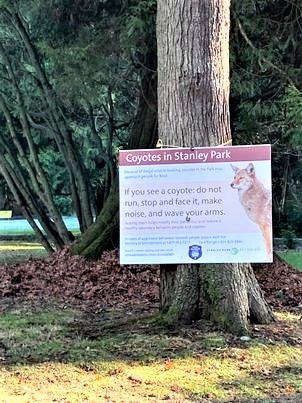Conservation officers are again warning the public about aggressive coyotes in Stanley Park after a woman was attacked by one on Tuesday.
The woman was walking along the seawall just west of the Prospect Point Lighthouse when she was bit on the calf by a coyote at around 9:15 p.m., said the B.C. Conservation Officer Service in a Facebook post.
Officers came and patrolled the area, but did not find the coyote.
This incident comes after several attacks by coyotes at the downtown Vancouver park.
Since Dec. 1, 2020, there have been at least 15 such attacks on park users, mostly runners, but also in two cases involving cyclists.
In one of the more serious cases, Azi Ramezani was bitten by a coyote while on the sidewalk of Stanley Park Drive, near the Hollow Tree, on Jan. 21.
On March 6, actor Alan Tudyk, who stars in the sci-fi series Resident Alien, said a coyote attacked his dog Raisin, who was saved by its leash. The coyote appeared persistent, trying to get at the dog for 10 minutes, wrote Tudyk on social media.
On March 5, West End resident Bernie Steininger was walking on Tatlow Trail when he noticed a coyote following him. He managed to scare off the coyote by screaming, raising his hands, and running towards the animal.
In January, conservation officers euthanized two coyotes believed to be responsible for a series of attacks on park-goers.
The Conservation Officers Service say people should consider avoiding Stanley Park at dawn and dusk when coyotes are more active.
“If you choose to go to Stanley Park, there is a risk you could encounter an aggressive coyote,” it warned.
It is not typical behaviour for coyotes to attack humans, especially adults. Experts say such aggressive behaviour is a result of the animals being conditioned with people as a result of direct or indirect feeding, and warn people against feeding coyotes or any wildlife in the park.
If a coyote approaches you, the service recommends making yourself look as large as possible; make a lot of noise, shout at the coyote; wave your arms, or throw objects at the animal. Do not turn your back on the coyote. Instead, continue to make noise and movements as you move slowly to safety, it said.
Any aggressive coyote encounters can be reported to the RAPP line at 1-877-952-7277.



